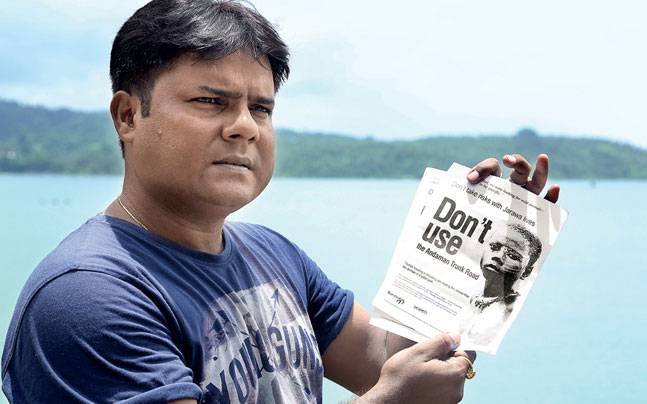My freedom to live: ‘A free life is one lived with dignity’ Editor of The Andaman Chronicle; activist and spokesman for the Jarawa tribe in the Andaman islands, Port Blair-based Denis Giles, 40, is currently campaigning against the public use of portions of the Andaman Trunk Road that cut through the Jarawa Tribal Reserve, attempting to put an end to human safaris. The Great Andamanese are one among the four aboriginal peoples of the Great Andaman archipelago. Today, they are just 50 in number. In Port Blair, you often spot them at taxi stands or at traffic signals, begging for survival. “Why do you go to see Jarawas, I’m a Jarawa,” they tell curious tourists. Give them a ten-rupee note and they’ll get themselves a drink with the money.
Most of them are clueless about mainland India, never mind the world. The government provides them everything-education, jobs, healthcare, rations but this still barely helps them survive. The problem is they have lost their identity and, most importantly, self-esteem. Once that happens, there’s no point living in this world. To live a free life, you have to be able to live with dignity. Boa Senior, who passed away in 2010, was the last surviving member of the community who spoke their traditional language, Bo. In spite of the example of this great loss for the Great Andamanese, little is being done to help the other tribes. I’m not an expert, but I have been campaigning for the Jarawas since 2002, when I first joined the Society for Andaman and Nicobar Ecology. Over the years I’ve realised that if one supports their cause, one must respect and consider them to be fellow human beings. To begin with, why not call them by their true name, ‘Ang’? Jarawa is a term the British adopted from the Great Andamanese; it means outsiders in their language. After decades of Independence, we haven’t even given them back their name. There are about 420 remaining from the tribe who live in the Jarawa Tribal Reserve. For over 60,000 years they have lived off the land, never taking more than they needed. In contrast, the so-called ‘civilised’ lot has taken just 60 years to ruin the parts of the island they occupy. The Jarawas have their own medicinal system, rituals and seasons. They believe in spirits and respect their elders. There’s no rape among the tribes, even though they move around ‘naked’. So who’s the civilised lot here? In 2004, the first official Jarawa policy was put in place, which forbade interaction and put an end to ideas of bringing Jarawas into the mainstream. But again, who are we to have this isolation versus mainstream debate?


